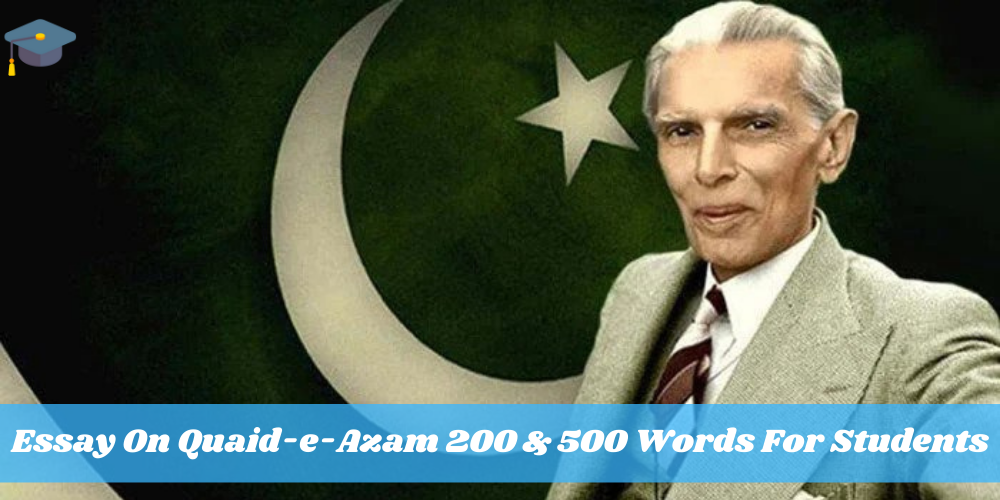

Essay On Quaid-e-Azam 200 & 500 Words For Students
| Aspect | Important Points |
|---|---|
| Muhammad Ali Jinnah | |
| December 25, 1876 | |
| Karachi, British India (now Pakistan) | |
| Founding Father of Pakistan | |
| Studied law at Lincoln’s Inn, London | |
| Party | All India Muslim League |
| Contributions | |
| Notable | |
| Vision for | |
| First Governor-General of Pakistan | |
200 Words Essay On Quaid E Azam
Introduction.
Quaid-e-Azam Muhammad Ali Jinnah, the esteemed founder of Pakistan, was a charismatic leader whose pivotal role in the creation of an independent nation for Muslims in the Indian subcontinent remains indelible. His exceptional qualities and unwavering determination continue to inspire individuals to this day. This essay sheds light on the unique and captivating attributes of Quaid-e-Azam that made him an iconic figure in Pakistan’s history.
Visionary Leadership
Quaid-e-Azam’s visionary leadership served as a beacon of hope for millions. With resolute conviction, he envisioned a separate homeland where Muslims could live with dignity and freedom. His farsightedness, coupled with his ability to articulate the aspirations of the people, inspired a sense of unity and purpose among his followers.
Unyielding Determination
Quaid-e-Azam’s determination knew no bounds. Despite facing formidable challenges, he remained steadfast in his pursuit of a separate nation. His resolute stance during negotiations with the British and his unwavering commitment to the cause of independence were instrumental in realizing the dream of Pakistan.
Charismatic Persona
Quaid-e-Azam possessed a magnetic personality that captivated the masses. His eloquence, grace, and dignified demeanor left an indelible impression on all who encountered him. His ability to connect with people from all walks of life made him an influential leader and an inspiration for generations to come.
Defender of Rights
Quaid-e-Azam was a staunch advocate for the rights of all individuals. He firmly believed in upholding justice, equality, and freedom for every citizen. His tireless efforts to protect the rights of minorities and marginalized communities showcased his unwavering commitment to building a just and inclusive society.
Quaid-e-Azam’s visionary leadership, indomitable spirit, and commitment to justice continue to inspire and guide Pakistan toward a brighter future. His legacy remains a testament to his remarkable character and enduring impact.
500 Words Essay On Quaid E Azam
Introduction:.
Quaid-e-Azam, Muhammad Ali Jinnah, stands as the eminent founding father of Pakistan. His influential role in the creation of Pakistan and his exceptional leadership during the independence movement has shaped the destiny of the nation. This essay delves into the remarkable life and achievements of Quaid-e-Azam, presenting a captivating account of his invaluable contributions to the birth of Pakistan.
Early Life and Education
Born into a privileged family on December 25, 1876, Quaid-e-Azam hailed from Karachi, which was then part of British India. His family background instilled in him a sense of dignity and honor. With a strong educational foundation, he pursued his studies in Karachi and later moved to England to refine his legal education at Lincoln’s Inn. Quaid-e-Azam’s unwavering dedication and commitment to his work as a lawyer earned him immense respect among his peers.
Political Career
Quaid-e-Azam’s journey in politics commenced with his early association with the Indian National Congress, where he sought to advocate for the rights of all Indians. However, growing disillusionment with Congress’s inability to protect the interests of Muslims led Quaid-e-Azam to part ways and spearhead the All India Muslim League. Under his astute leadership, he aimed to unite the fragmented Muslim population and secure their rightful place in the Indian subcontinent.
Demand for Pakistan
Quaid-e-Azam’s historic Fourteen Points and the Lahore Resolution are emblematic of his resolute determination to establish an independent Muslim state. He envisaged a land where Muslims could thrive and flourish without fear of marginalization. His unwavering commitment and persuasive negotiations with the British and Congress paved the way for the creation of Pakistan on August 14, 1947.
Leadership during the Independence Movement
As the leader of the Muslim League, Quaid-e-Azam emerged as a skilled diplomat and negotiator during the tumultuous partition process. Despite facing numerous challenges, he navigated the delicate political landscape with remarkable resilience, ensuring the rights and protection of minority communities. His indomitable spirit and steadfast leadership provided the strength needed to overcome the trials of independence.
Vision for Pakistan
Quaid-e-Azam’s vision for Pakistan was rooted in democratic values, inclusivity, and social justice. He championed the cause of religious freedom and emphasized the importance of equality among all citizens. Through his impassioned speeches and addresses, he outlined his vision for a modern, progressive, and prosperous Pakistan, where every individual had the opportunity to succeed.
Quaid-e-Azam’s enduring legacy remains etched in the fabric of Pakistan’s history. His contributions to nation-building, such as the drafting of the country’s constitution, continue to shape the nation’s trajectory. As Pakistan’s first Governor-General, he nurtured unity and stability during the early years, setting a precedent for future leaders.
In conclusion, Quaid-e-Azam Muhammad Ali Jinnah’s exceptional leadership and visionary guidance played a pivotal role in the creation of Pakistan. His unwavering commitment to the rights of Muslims and his relentless pursuit of a separate homeland have left an indelible mark on the nation. Today, Pakistan stands as a testament to Quaid-e-Azam’s principles, serving as a source of inspiration for generations to come. As we remember his illustrious legacy, we must strive to uphold the values of unity, equality, and progress that he ardently advocated.
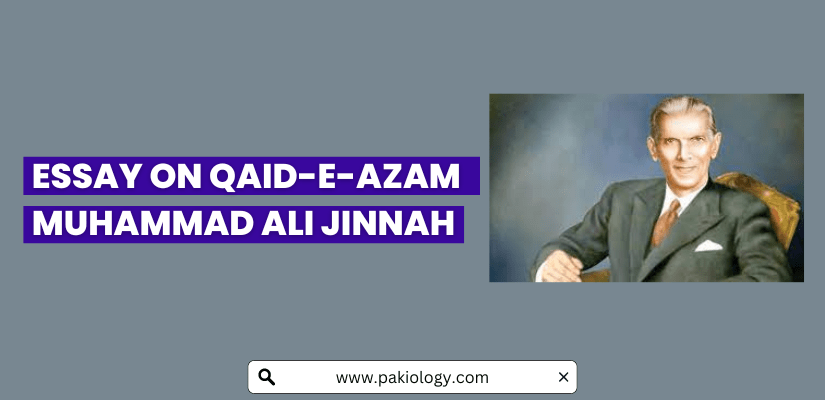
Essay on Qaid-e-Azam Muhammad Ali Jinnah With Quotations
by Pakiology | Aug 19, 2024 | Essay | 0 comments
Quaid-e-Azam Muhammad Ali Jinnah was a prominent political leader and the founder of Pakistan. Born in Karachi in 1876, Jinnah studied law and became a successful lawyer before entering politics. Over the course of his career, he played a pivotal role in the creation of the country of Pakistan and served as its first Governor-General.
Jinnah’s political career began in 1906 when he joined the Indian National Congress, a political party that sought greater autonomy for India within the British Empire. However, Jinnah quickly became disillusioned with Congress and its leadership, and he left the party in 1913.
In 1919, Jinnah joined the All-India Muslim League, a political party that represented the interests of India’s Muslim population. At the time, many Muslims felt that their rights and interests were not being adequately protected by Congress, and they saw the Muslim League as a way to promote their own political agenda.
Jinnah was a strong advocate for the rights of Muslims in India. In a speech to the All India Muslim League in 1943, he said,
“I have always maintained that the Muslims are a nation apart. The Hindu and the Muslim are two major nations by any definition or test of a nation. We are a nation of a hundred million, and what is more, we are a nation with our own distinctive culture and civilization, language and literature, art and architecture, names and nomenclature, sense of value and proportion, legal laws and moral code, customs and calendar, history and tradition, aptitudes and ambitions.”
In 1940, the Muslim League adopted the Lahore Resolution, which called for the creation of a separate Muslim state in the northwestern and northeastern regions of India. This marked the beginning of the movement for the creation of Pakistan. Jinnah worked tirelessly to achieve this goal, negotiating with the British government and other political parties to secure support for the creation of Pakistan.
In a speech to the Constituent Assembly of Pakistan in 1947, Jinnah said,
“You are free; you are free to go to your temples, you are free to go to your mosques or to any other place of worship in this State of Pakistan. You may belong to any religion or caste or creed – that has nothing to do with the business of the State.”
Jinnah’s efforts finally paid off in 1947 when the British government agreed to partition India and create the independent state of Pakistan. Jinnah became the first Governor-General of Pakistan, and he worked to establish the country’s government and institutions. However, he faced numerous challenges, including a refugee crisis, economic instability, and tensions with India over the disputed territory of Kashmir.
In a speech to the Constituent Assembly of Pakistan in 1948, Jinnah said,
“We are starting with this fundamental principle that we are all citizens and equal citizens of one state. Now I think we should keep that in front of us as our ideal and you will find that in course of time Hindus would cease to be Hindus and Muslims would cease to be Muslims, not in the religious sense, because that is the personal faith of each individual, but in the political sense as citizens of the State.”
Despite these challenges, Jinnah remained committed to building a strong and prosperous Pakistan, and he worked tirelessly to lay the foundations for the country’s future success. He believed that Pakistan should be a country where all citizens, regardless of their gender, religion, or ethnicity, were treated equally and had equal opportunities.
“I have full faith in the future of Pakistan and the destiny of our people. You have to stand guard over the development and maintenance of Islamic democracy, Islamic social justice, and the equality of manhood in your own native soil.”
Jinnah’s legacy as the founder of Pakistan is undeniable. He was a visionary leader who saw the potential for a separate Muslim state and worked tirelessly to achieve it. His efforts were instrumental in the creation of Pakistan, and he remains an important figure in the country’s history. He will always be remembered as the father of the nation.
Find more Essays on the following Topics
Ask Your Questions
You might like, islamophobia css essay – understanding, addressing, overcoming.
Islamophobia is a growing problem in many parts of the world. It refers to the fear, hatred, or discrimination against...
My Favourite Personality Essay | 400 & 600 Words
Essay 1 (400 Words) : My Favourite Personality Is My Mother My favourite personality is my mother. She is kind,...
Why I Love Pakistan Essay | 400, 500 & 700 Words
400 Words Essay on Why I Love Pakistan With Quotation Pakistan is a country full of diversity and richness in culture,...
Democracy in Pakistan Essay with Quotations
Explore the evolution, challenges, and progress of democracy in Pakistan in this in-depth essay. Gain insights into...
Submit a Comment Cancel reply
Your email address will not be published. Required fields are marked *
Save my name, email, and website in this browser for the next time I comment.
Submit Comment
- class-9-notes
- Friendship quotes
- Scholarships
- Science News
- Study Abroad
- Study in Australia
- SZABMU MDCAT
- UHS Past MCQs
- Universities

Essay on Quaid-e-Azam Muhammad Ali Jinnah with Quotes and Outlines

- December 19, 2023
Kainat Shakeel
Quaid-e-Azam Muhammad Ali Jinnah, the founder of Pakistan, was a visionary leader who devoted his life to the cause of Pakistan. Born on December 25, 1876, in Karachi, Jinnah was a counsel, politician, and leader of the All-India Muslim League from 1913 until the establishment of Pakistan in 1947.
Early Life and Struggles:
Quaid-e-Azam was born into a Khoja family of Hindu parents who had converted to Islam and followed the Shia faith. He entered his early education at home before attending Sindh Madrasa Academy in Karachi. In 1893, he moved to England to pursue a law degree at the University of London. While in England, Jinnah was told by nationalist politicians and originally aimed to become” a Muslim Gokhale,” fastening on Muslim interests within the environment of Indian nationalism still, by the morning of the 20th century, the growing conviction among Muslims demanded the preservation of separate Muslim interests, leading to the founding of the All-India Muslim League in 1906.
Achievements and Leadership:
In 1913, Jinnah became the leader of the All-India Muslim League, a position he held until the establishment of Pakistan in 1947. He played a pivotal part in the non-cooperation movement of 1920, which aimed to gain Indian independence through violent means. In 1924, he was tagged to the Viceroy’s Executive Council, making him the first Muslim member of the British Indian government. Despite his benefactions, Jinnah abnegated in 1925 due to dissensions with Mahatma Gandhi over the nature of the non-cooperation movement. Jinnah’s leadership and determination were necessary in the passage and perpetration of the Pakistan Resolution in 1940, which demanded the creation of separate Muslim and Hindu countries. In August 1947, Pakistan came into being, and Jinnah became its first governor-general.
Personal Traits and Vision for Pakistan:
Quaid-e-Azam was known for his strong personality, seductiveness, and leadership chops. He was a professed lecturer and pen, able to rally people around his vision for Pakistan. Jinnah envisaged a Pakistan where all citizens, regardless of their faith, race, or gender, would be equal and have the occasion to prosper. He believed in the significance of education, profitable tone-reliance, and social justice for the development of the country.
Quotes from Quaid-e-Azam:
Then are some memorable quotations from Quaid-e-Azam;
- “Pakistan isn’t a piece of land for us. It’s a living, breathing reality that we’ve to nurture and develop. It’s a commodity that belongs to all of us, and all of us must put in our sweats, our smarts, and our hearts to make it a success.”
- “We’ve to make a new Pakistan, where the weak will get justice and the strong won’t exploit the weak.”
- “I wish to make it clear that the people of Pakistan, the Muslims and non-Muslims, will have to live together. There will be no question of equivalency because we’re all equal. There will be no question of maturity or nonage because we’re all equal. There will be no question of a separate motherland for Muslims or non-Muslims because we’re all Pakistanis.”
- “May you be firm and bent in your faith. Don’t allow anyone to make you diverge from your path.”
Quaid-e-Azam Muhammad Ali Jinnah’s fidelity and leadership played a pivotal part in the establishment of Pakistan and the shaping of its identity. His vision for a just, equal, and prosperous country remains the foundation of Pakistan’s bourses and progress. In his memory, we must continue to work towards realizing his dream of a united, inclusive, and thriving Pakistan.

Kainat Shakeel is a versatile SEO-Content Writer and Digital Marketer with a keen understanding of tech news, digital market trends, fashion, technology, laws, and regulations. As a storyteller in the digital realm, she weaves narratives that bridge the gap between technology and human experiences. With a passion for staying at the forefront of industry trends, her blog is a curated space where the worlds of fashion, tech, and legal landscapes converge.
Quaid-e-Azam Essay
Muhammad Ali Jinnah, known as Quaid-e-Azam, is a prominent figure in the history of Pakistan. Born on December 25, 1876 in Karachi, he played a key role in nation building. In this “ Quaid-e-Azam Essay” we explore the life of Quaid-e-Azam and his impact in simple language.
Table of Contents
Early Life and Education
Quaid-e-Azam went to school in Karachi and later studied in London. He became a lawyer, someone who helps people understand and follow the law. He had no idea that his path was meant for something extraordinary.
Quaid-e-Azam Essay: Starting in Politics
Quaid-e-Azam started his journey in politics by joining the All India Muslim League in 1906. He wanted to ensure that the rights of Muslims in British India were protected. Over time, he became a strong voice for Muslims and worked tirelessly for their welfare.
Dreaming of a Separate Nation
One of the great things that Quaid-i-Azam dreamed of was a country where Muslims could live freely and practice their religion without any problems. He called this country Pakistan. The idea was that Muslims and Hindus, two different religious groups, could have their own separate countries and live in peace. The friendship /relationship between Quaid-e-Azam Muhammad Ali Jinnah and Allama Iqbal was an important alliance that significantly shaped the history of Pakistan.
The Long Struggle and the Birth of Pakistan
The journey to create Pakistan was not easy. Quaid-i-Azam faced many challenges and had to work hard to convince people about the need for a separate nation. Finally on 14 August 1947, Pakistan became an independent country. It was a joyous day, marking the end of British rule and the beginning of a new chapter for millions.
Leading During Difficult Times
It was a difficult time when Pakistan was formed. There were many people coming and going in the new country. Quaid-e-Azam demonstrated strong leadership and tried to ensure that everyone, irrespective of their religion, felt safe and secure. He wanted Pakistan to be a place where people from different backgrounds could live in peace.
A Leader Loved by All
Quaid-e-Azam was not only a leader. He was also a person who was liked by everyone. He was known for his honesty, simplicity and kindness. People respected him not just because he was a leader but because of the person he was.
Leaving a Lasting Legacy
Although Quaid-i-Azam died soon after the creation of Pakistan, his legacy lives on. His vision for a united, progressive and tolerant Pakistan is something we still talk about today. His principles of unity, faith and discipline guide our nation.
Quaid-e-Azam Essay is a story life of Quaid-i-Azam is a story of dedication, struggle and victory. He showed us that with determination and unity we can overcome any challenge. His vision for a peaceful and inclusive Pakistan continues to inspire generations. Quaid-e-Azam will always be remembered as the great leader who gave us the gift of freedom.
Essay on Quaid e Azam “Unveiling the Legacy in 600 Words”
Introduction.
Quaid-e-Azam Muhammad Ali Jinnah, revered as the “Father of the Nation,” stands as a prominent figure in the history of Pakistan. His life, marked by leadership, vision, and statesmanship, played an important role in the creation of the independent state of Pakistan in 1947. This essay on Quaid e Azam delves into the introductory aspects of Quaid-e-Azam’s life, tracing his early years, education, entry into politics, and the enduring impact he left on the emerging nation.
Quaid-e-Azam was born on December 25, 1876, in Karachi, then part of British India. His early life was characterized by academic brilliance and a thirst for knowledge. Growing up in a well-off family, he laid the foundations for a remarkable journey that would shape the destiny of millions.
Jinnah’s quest for knowledge led him to pursue law in London, England. His educational journey in a foreign land not only polished his legal insight but also exposed him to diverse ideas and cultures, shaping the worldview that would later define his leadership.
Entry into Politics
Quaid-e-Azam’s entry into politics marked a significant turning point in his life. Initially joining the Indian National Congress, he soon realized the need for a platform that championed the rights of Muslims, leading him to become a prominent figure in the All-India Muslim League.
Essay on Quaid e Azam: Two-Nation Theory
At the heart of Jinnah’s political ideology lay the Two-Nation Theory, which asserted that Hindus and Muslims were distinct nations with different religious, social, and cultural foundations. This theory became the foundation stone of the demand for a separate homeland for Muslims.
Leadership and Advocacy
Quaid-e-Azam’s leadership and advocacy for Muslim rights were instrumental in the negotiations with the British and leaders of the Indian National Congress, ultimately leading to the creation of Pakistan on August 14, 1947. His statesmanship during the challenging period of partition showcased his ability to navigate complex circumstances.
Legacy and Impact
Quaid-e-Azam’s legacy extends beyond the political realm. His founding principles of democracy, inclusivity, and religious freedom continue to shape Pakistan’s identity. His contributions to education, including the establishment of institutions like Quaid-e-Azam University, highlight his commitment to knowledge and enlightenment.
In conclusion, Quaid-e-Azam Muhammad Ali Jinnah’s introduction sets the stage for a deeper exploration of his life and contributions. His journey from a brilliant student to a visionary leader reflects a commitment to justice, freedom, and the principles that define the nation he helped create.
Why is Quaid-e-Azam considered the “Father of the Nation”?
Quaid-e-Azam’s leadership and role in the creation of Pakistan earned him the title, symbolizing his pivotal role in the nation’s foundation.
What is the Two-Nation Theory, and why is it significant?
The Two-Nation Theory asserted that Hindus and Muslims were distinct nations, forming the basis for the demand for a separate Muslim state. It is significant as it influenced the creation of Pakistan.
How did Quaid-e-Azam contribute to education in Pakistan?
Quaid-e-Azam’s commitment to education is evident in the establishment of institutions like Quaid-e-Azam University, reflecting his belief in the importance of knowledge.
What challenges did Quaid-e-Azam face during the partition, and how did he handle them?
The partition was marked by communal tensions and mass migrations. Quaid-e-Azam’s statesmanship and diplomatic skills played a crucial role in ensuring a relatively smooth transition for the newly formed nation.
What are the enduring principles that Quaid-e-Azam left for Pakistan?
Quaid-e-Azam ‘s principles of democracy, inclusivity, and religious freedom continue to shape Pakistan’s identity, emphasizing the values that form the nation’s foundation.
Also Read: My Best Friend Essay
Leave a Comment Cancel Reply
Your email address will not be published. Required fields are marked *
Save my name, email, and website in this browser for the next time I comment.
Essay on Qaid-e-Azam Muhammad Ali Jinnah with Quotes and Outline
This post contains an Essay on Qaid-e-Azam Muhammad Ali Jinnah with Outline and Quotations for the Students of Class 10, Class 12 and Graduation. This is an awesome essay with a very good vocabulary. Students who are looking for this essay can get the benefit from it. I got 2 images from the internet and typed this essay from there. There are some Other Essays available Here.
Essay on Qaid-e-Azam Muhammad Ali Jinnah with Outline and Quotations for FA, FSC, 2nd Year and Graduation
- A National hero is a man of exceptional qualities.
- History is replete with great heroes.
- Early life and education of Qaid e Azam.
- A source of inspiration.
- Marvellous leadership and remarkable achievement.
“Greatness be nothing unless it be lasting.” (Napoleon)
A National Hero is a man of exceptional Qualities. With his selfless and sincere efforts, he can mould the fate of his nation. He is a man of determination will-power, stimulates the energy, courage and enthusiasm of the people and welds them into a nation. His words have the power to inspire devotion and dedication. Carlyle has said:
“All history is the biography of great men.”
History is replete with great heroes but my own hero in history is the Quaid e Azam, Muhammad Ali Jinnah. I like him because of his marvellous personality and noble soul. His matchless leadership liberated the oppressed Muslims of the sub-continent from the cruel slavery of the Hindus and imperialism.
The Quaid e Azam was born in Karachi on the 25 th of December, 1876, in a well-off merchant family. He received his early education in Karachi. His father, Poonjah Jinnah, wanted to give him a good education to his son and kept him away from the business. At the age of sixteen, on passing the matriculation examination, he went to England and studied law at Lincoln’s Inn. After four years, he returned as a Barrister and started his practice in Karachi. Then, he shifted to Bombay. Within a short time, he became a distinguished lawyer.
In those days, Indians were struggling for freedom. He decided to take an active part in politics. He joined the Indian National Congress and worked for the freedom of his country. His political career began in 1909 when he was elected to the Indian Legislative Council. He joined the Muslim League in 1913 and tried to establish a working relationship between the Hindus and the Muslims. He was called the “Ambassador of Hindu Muslim unity”. But, he was disillusioned very soon. He realized that the Indian Congress was not sincere for the cause of the Muslims. He was convinced that Hindu-Muslim unity was not possible. So, he decided to leave the Indian National Congress in 19+20.
The Quid e Azam infused new life, energy and spirit into the dull body of the Indian Muslims. His sincere and devoted leadership kindled a new imagination among frustrated Muslims. He awakened them from their slumber and organized them as a nation. He told the Muslims that the only solution to their problems was that they should have their own separate homeland where they could live their life according to their religion and culture.
“Time makes heroes but dissolves celebrities.” (Boorstin)
As a result of the untiring struggle of the Muslims under the selfless and marvellous leadership of the Quid e Azam, Pakistan came into being on the 14 th August 1947. The Quaid e Azam became the first Governor-General of Pakistan. Inspite of his shattered health, he worked day and night for the great task of nation-building He died in harness on the 11 th September 1948. He will always live in our hearts as the “Father of the Nation”.
“A good man never dies” (Callimachus)
- More In English Essays
Essay Writing 101: The Basics That Every Writer Should Know

Students and Social Service Essay with Quotations

Load Shedding in Pakistan Essay – 1200 Words
Ayesha Farrukh
January 26, 2021 at 7:56 pm
Nice work. Bro keeps it up.
January 26, 2021 at 3:04 pm
Leave a Reply Cancel reply
Your email address will not be published. Required fields are marked *

- Privacy Policty
- Terms of Service
- Advertise with Us
- Privacy Policy

Quaid-e-Azam Essay
- Informal Letters
- Personal Letters
- English Stories with moral lessons
- Applications to the Principal
- English Stories
- Business Letters
- More Essays>>>
3 comments:
السلام عليكم ورحمة الله وبركاته
Walaikum slam
Tu har jagha Aya hai?
Post a Comment
Trending Topics
Latest posts.
- Class 11 Total marks | FA, FSC, ICS, I.com
- 2nd Year English Complete Notes in PDF
- Islamiat lazmi complete notes for 10th class pdf download
- 1st year English complete notes pdf download
- 2nd Year Part II Book II Questions Notes free PDF Download
- 2nd year all subjects notes PDF Download
- 1st year all subjects notes for FBISE and Punjab Boards pdf
- 1st year Urdu Khulasa Nasar and Nazam pdf download
- 1st year sarmaya Urdu book PDF Download
- Sindh Board Books PDF Class 12
- FBISE HSSC 1 total marks and syllabus 2024
- BISE Hyderabad
- BISE Lahore
- bise rawalpindi
- BISE Sargodha
- career-counseling
- how to pass
- Punjab Board
- Sindh-Board
- Solved mcqs
- Student-Guide
blogtoeducate
Learning Never Ends

Quaid-e-Azam Mohammad Ali Jinnah
This post aims to give a description of the Quaid e Azam essay. Muhammad Ali Jinnah known as Quaid e Azam was a lawyer, politician, great leader, and the creator of Pakistan.
Table of Contents
Introduction of Quaid e Azam essay
Muhammad Ali Jinnah is famous for leading the Muslim League and helping to create the independent homeland of Pakistan. Jinnah was a man of strong character, who not only influenced his own life but also had a major role in the establishment of Pakistan. Even his opponents call him “great”, “extraordinarily brilliant”, and “a man born in centuries”. His intelligence and insight were truly remarkable.
Early childhood
Quaid was born on December 25, 1876, in Karachi to Poonja Jinnah and Mithibai. He had five siblings, and the youngest sister was Fatima. He belonged to khoja caste. His ancestors converted to Islam centuries ago. In 1874, his family moved to Karachi from a small village in search of prosperity. He liked games and became the leader of his playmates, in that field. He also loved horse riding.
When he was six, his parents began educating him in Gujrati at home. He proved to be a brilliant learner. He was excellent in arithmetic. His success as a learner led to his admission into the Sindh madrassa-tul-Isam in 1887 and then the Christian missionary school in 1892. Shortly before his sixteenth birthday, Quaid left for England to enroll at Lincoln’s Inn and graduated as a Barrister in 1895. Living abroad had an enormous influence on his lifestyle and political philosophy.
He returned home in 1896. He was determined to become an Advocate at the Bombay High court despite it being dominated by British, Parsi, and Hindu practitioners. Jinnah achieved success as a Magistrate but gave up this post for greater ambitions in 1900.
1906 was a landmark in the political career of Jinnah. In that year, he stepped up from local to all Indian politics. In 1906, he joined Indian National Congress. From 1906 to 1913, he became a respected figure not only Congress party but also in Muslim League. Soon he came to know that Congress is working only for Hindus. So, he joined All India Muslim League in 1913. All India Muslim League was founded at Dhaka in December 1906.
Jinnah turned to be a key leader in the Muslim League. He suggested a fourteen-point amended proposal to protect the rights of Indian Muslims. Jinnah was in great favor of Hindu–Muslim unity in the beginning of his political career. Till 1920, he was the member of both political parties. However, Jinnah left the Congress in 1920.
Creation of Pakistan
Until late 1930s, most Muslims of the British Raj were expecting to be part of a single state that included all British India. In 1930, in a speech at Allahabad, Sir Muhammad Iqbal suggested a state for Muslims. Also, Choudhary Rahmat Ali suggested a name “Pakistan” for a separate homeland in the Indus Valley.
The Muslim League, under Jinnah’s leadership, passed the Lahore Resolution in 1940 which called for an independent nation for Indian Muslims. Jinnah stated that Hindus and Muslims have distinct civilizations which are substantially incompatible. So, they cannot live together. Finally, on 20 February 1947, it was declared that Britain will transfer power to India within a year. Ultimately, on 14 August 1947, Pakistan was established, and celebrations were led by Jinnah in Karachi.
After years of struggle, Muhammad Ali Jinnah finally achieved his goal of creating an independent Pakistan in 1947. Jinnah became the country’s first governor-general. He faced various challenges to survive the new state. He served Pakistan until his death in 1948. Muhammad Ali Jinnah died at age of 71, just 13 months after the creation of Pakistan. His legacy continues to be felt in Pakistan today and he is revered as the country’s founding father. He is still considered as the greatest leader in the struggle for independence of Pakistan.
Conclusion of Quaid e Azam Essay
Muhammad Ali Jinnah was born in Karachi, British India in 1876 and died in 1948. He was very active in politics. Jinnah served as the Muslim League’s president and worked towards independence for Pakistan. He was a skilled negotiator. He was able to get important concessions from the British government during negotiations for independence. Quaid e Azam finally succeeded to lay the foundation of Pakistan in 1947.
Related Posts
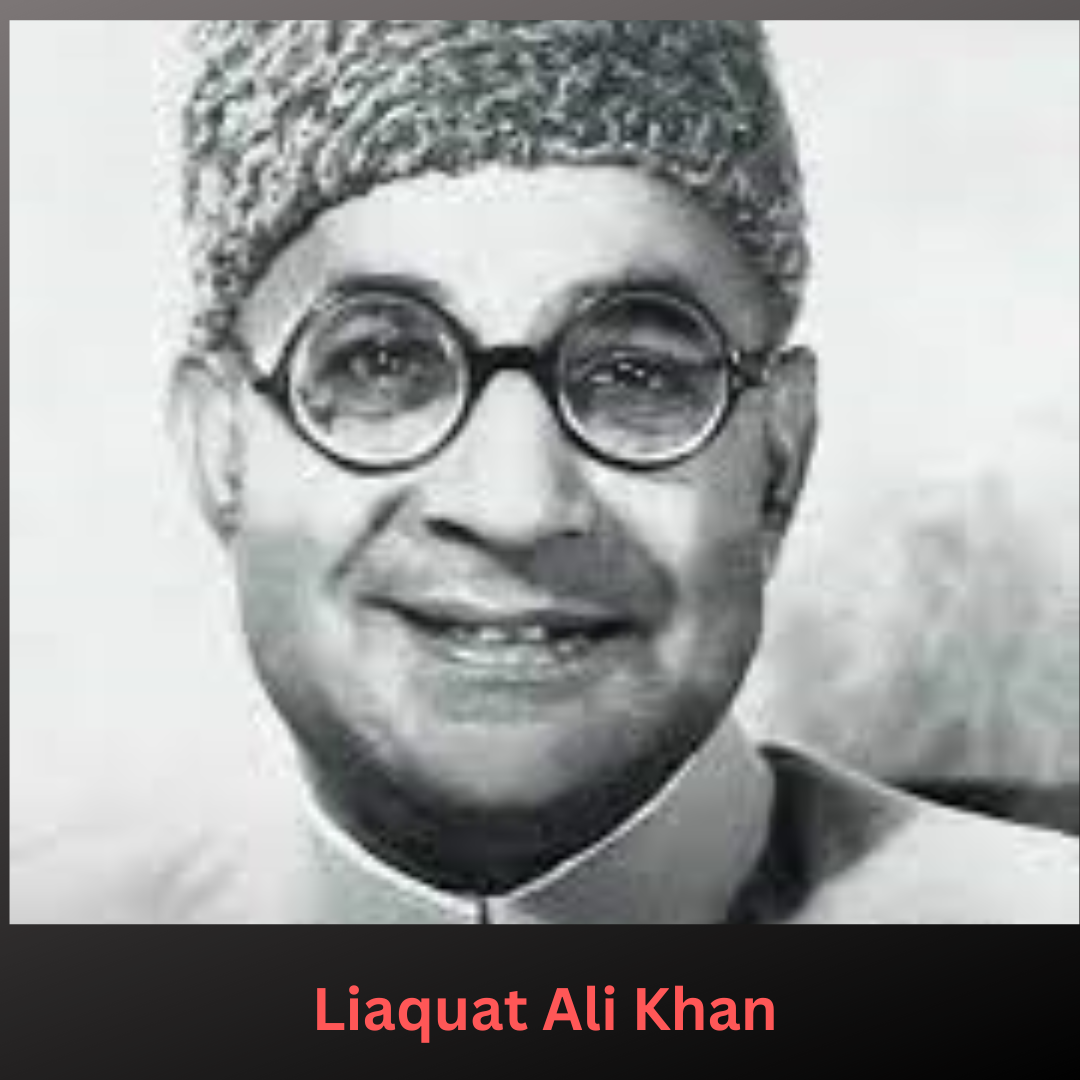
Comments (2) on “Quaid-e-Azam Mohammad Ali Jinnah”
- Pingback: What is the two nation theory | How it led to Pakistan |
- Pingback: 14 points of Quaid e Azam | A response to Nehru report |
Leave a Reply Cancel reply
Your email address will not be published. Required fields are marked *
Save my name, email, and website in this browser for the next time I comment.

Ilm Ki Awaz
Quaid e Azam Essay in English Language with headings
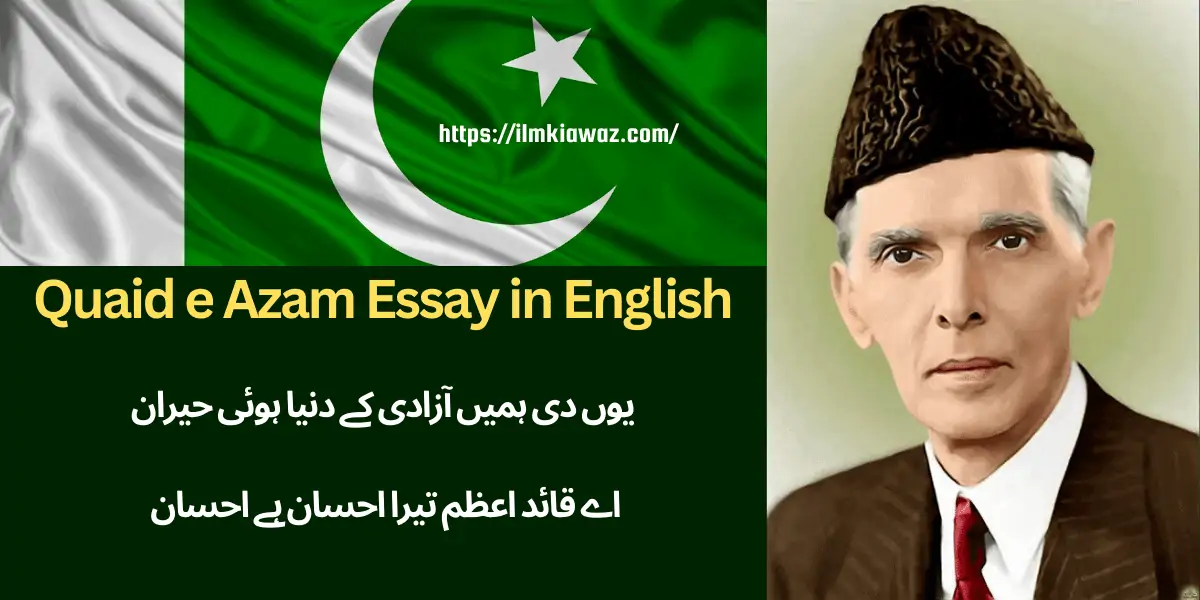
Today we will write about Quaid e Azam Essay in English with headings, pdf and quotations for classes 3 4 5 6 7 8 9th 10th and others in easy and short wordings. Muhammad Ali Jinnah was the real name of Quaid e Azam. Quaid e Azam Muhammad Ali Jinnah is one of my all-time historical and national heroes.
Our nation leader Quaid e Azam Mohammad Ali Jinnah was born on December 25, 1876, in Karachi. He was a lawyer and politician who established Pakistan. The political career of Jinnah was prosperous and long. As the nation’s first Governor-General, he oversaw Pakistan and is credited with directing it during this crucial period.
Quaid e Azam Mohammad Ali Jinnah made significant efforts to promote peace and stability after the nation attained independence. Still viewed as a towering figure in Pakistani history by millions of people worldwide. Maulana Azharuddin bestowed upon Muhammad Ali Jinnah the titles of “Quaid e Azam” (The Great Leader), “Baba e Qoum,” and “Father of the Nation,” respectively.
Introduction
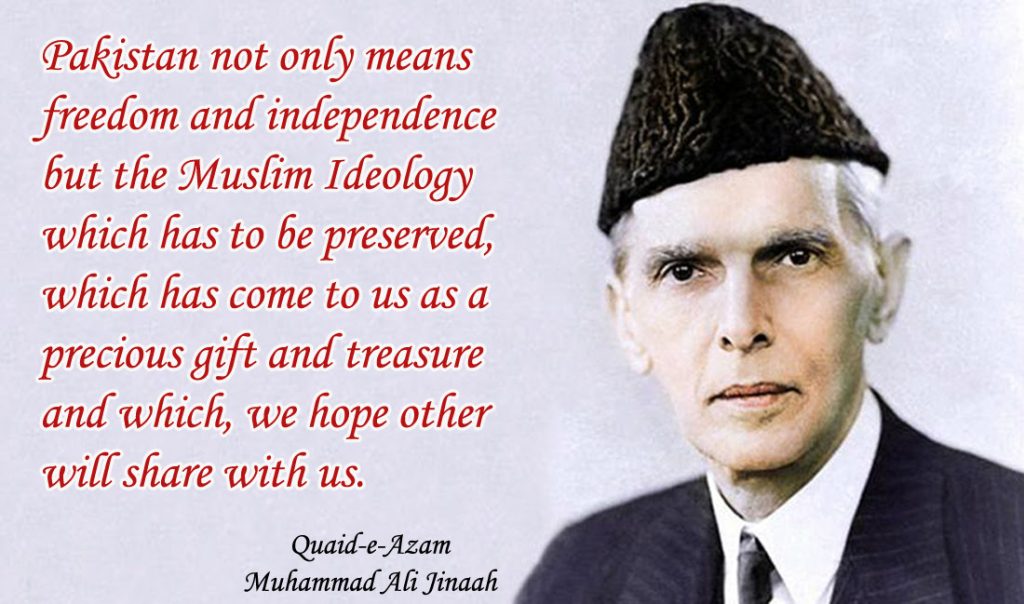
Born and Family early life of Quaid e Azam
On December 25, 1876, Quaid e Azam Muhammad Ali Jinnah was born in Karachi. Poonja Jinnah, his father, was a well-known trader in Rajkot. Quaid e Azam received a very kind and caring upbringing.
In Karachi, he completed his early education. He was initially accepted into Sindh Madrasa High School. He was a young Indian who associated with Lincoln’s Inn in 1893. After three years in Bombay, he rose to the rank of a prominent lawyer.
Political Quicksand
In 1905, he entered politics as a representative of the Indian National Congress. He travelled to England as a supporter of the Congress and spoke out in the British elections in Favour of India’s self-rule.
He was a young man with great promise and intelligence. On its main entrance were the names of well-known global lawmakers. The Holy Prophet’s name was inscribed at the very top. He thus joined that inn. After receiving his Bar-at-Law certificate, he returned to Karachi.
He encouraged Muslims across the subcontinent to exercise their right to self-determination by joining the Muslim League. He wisely remarked, “We’re the distinct nation with the distinguishing civilization, our own culture, language and literature, names and nomenclature, legal laws and moral code, art and architecture, values and proportion sense, aptitudes and ambitions, customs and calendar, history and tradition, and, to put it briefly, we have the distinguish outlook on life. We are a nation because of all international conventions and laws.
All-India Muslim League
In 1910, the Imperial Legislative Council (ILC) was founded, and Quaid e Azam was chosen as its first president. Throughout his time in parliament, he was the leading advocate for Indian freedom rights. He was the most powerful Indian with the necessary skills to steer the private member’s bill through Council. He rose to the position of group leader in the legislature.
In 1913, Quaid-e-Azam joined the All-India Muslim League while continuing to be a member of Congress. Because of the Satyagraha movement, he resigned from his position as a congressman in 1920.
Essential Functions
It granted the ability of Muslims to vote separately and the reservation of seats in the legislature, resulting in powerful representation for the minority and the provinces in the centre. The pattern strengthened the exclusivity of Muslims in Indian politics. He deserves all the credit for the Muslim faith.
Muslims and Hindus alike recognized Quaid-e-Azam as India’s greatest political figure in 1917. In the ILC and Congress, Muhammad Ali Jinnah was a truly outstanding figure. He was represented as the President of the All-India Muslim League and the Home Rule League, Bombay Branch. Due to his outstanding efforts in the Lucknow Congress-League Agreement, he was referred to as a peerless ambassador of the Hindu-Muslim union.
The Quaid-e-Azam Mohammad Ali Jinnah was heavily involved in keeping track of Muslim legislation pertaining to Pakistan. His support for distinct countries and his innovative negotiation tactics, particularly in the immediate aftermath of the war, made separate states unavoidable.
Achievements of Quaid e Azam
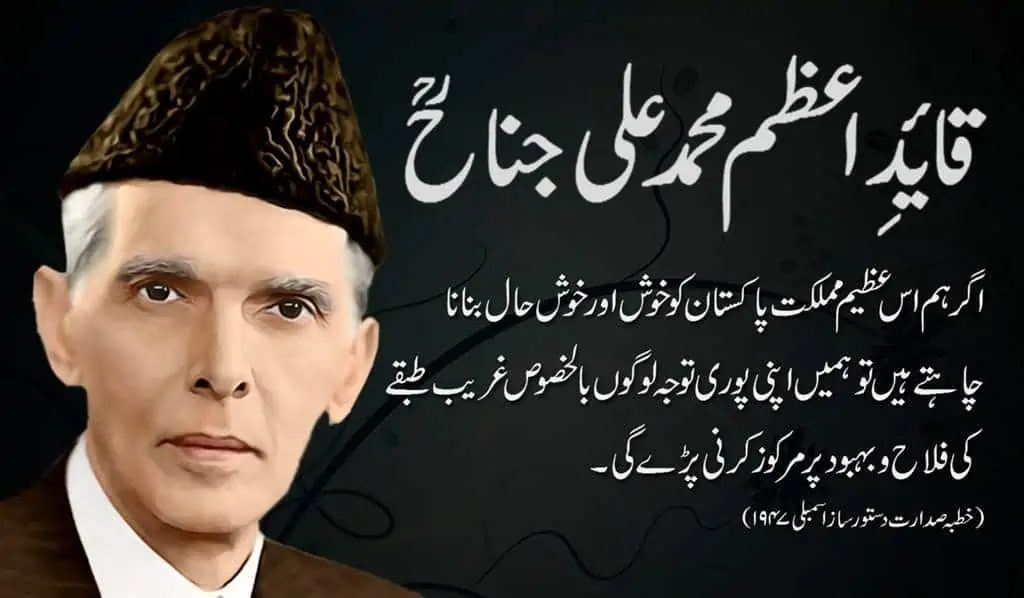
He put out the demand to split India into Pakistan and India in 1940. The Pakistan Resolution is the name of it. He campaigned for Indian Muslims’ independence. He boldly handled the opposition from the English and Hindus. He put in an unending effort, and on August 14, 1947, Pakistan was born. He was chosen to serve as Pakistan’s first Governor-General.
Quaid e Azam Death Date
He put in day and night labour to create the biggest Muslim state. His condition deteriorated. In 1948, on September 11, he met his maker. The entire country lamented his passing. In Karachi, his tomb has been constructed. The most well-liked Muslim leader at the time was him.
Quaid e Azam Mohammad Ali Jinnah’s final message
On August 14, 1948, Jinnah made his final speech to the nation. In it, he expressed his tremendous joy at having reached his goal. He stated:
The foundations of your State have been laid; it is now up to you to keep constructing as quickly and effectively as you can. In order to finish the task, he had taken on the day Pakistan was created, Jinnah had worked himself to death.
10 lines on Quaid e Azam Mohammad Ali Jinnah in English
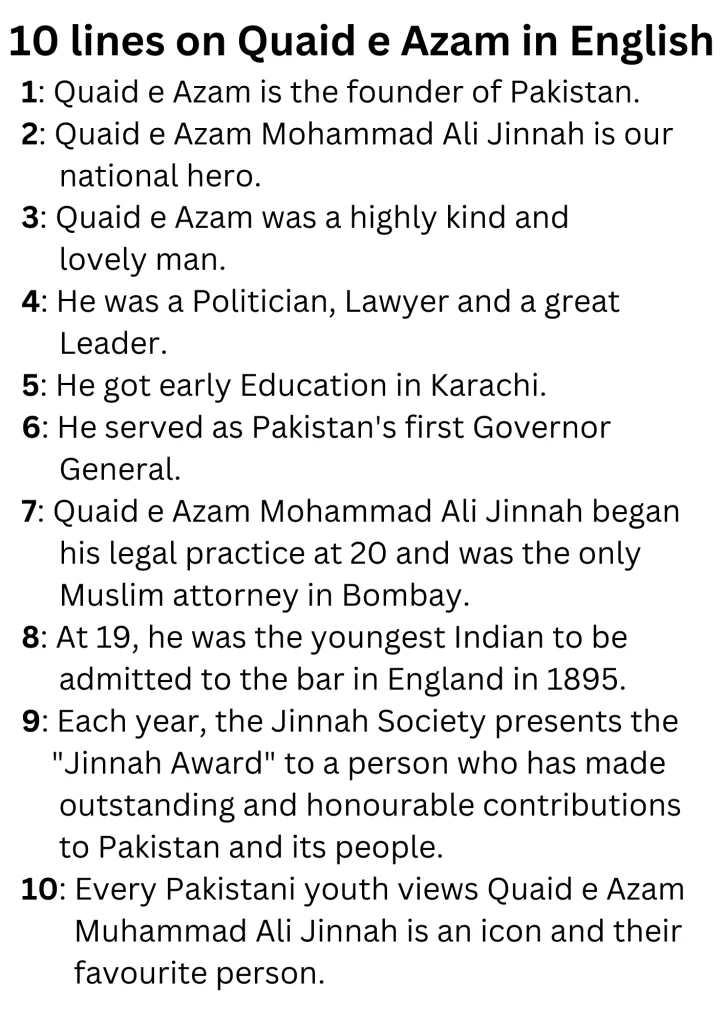
My Favourite Personality Quaid e Azam Essay Short
Note : I hope you appreciate reading about the best and short Essay on Quaid e Azam in the English language for classes 3 4 5 6 7 8 9th 10th and others in easy and short wordings. you can also read the best
Allama Iqbal Essay in Urdu
Eid ul Adha Essay in Urdu
Related Posts
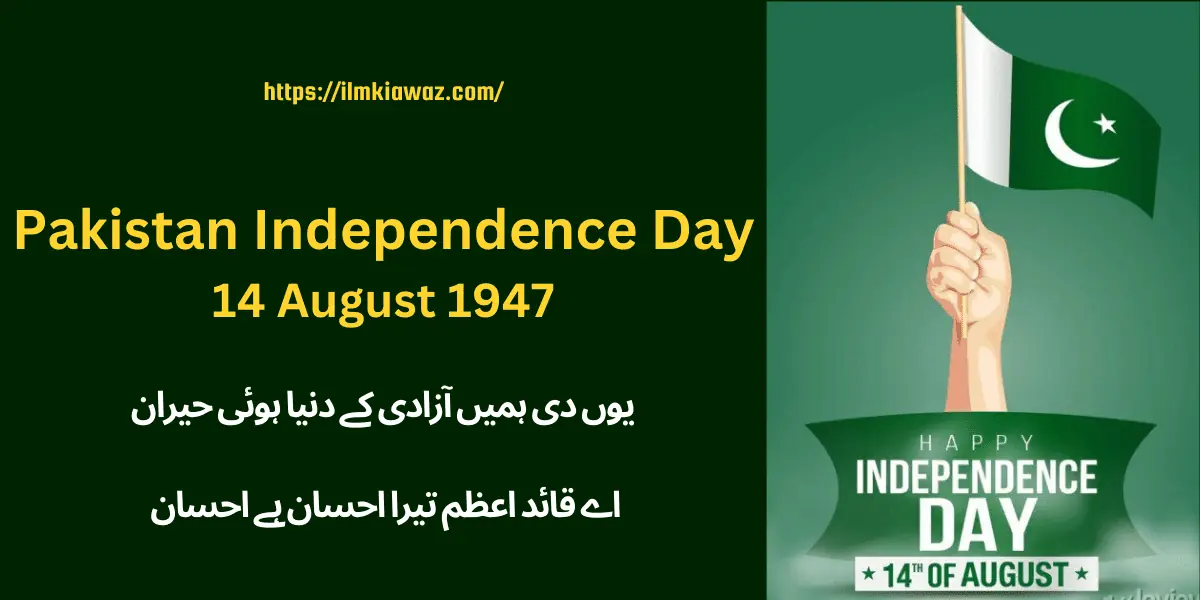
Pakistan Independence Day on 14 August 1947, 2023
August 10, 2023 December 31, 2023
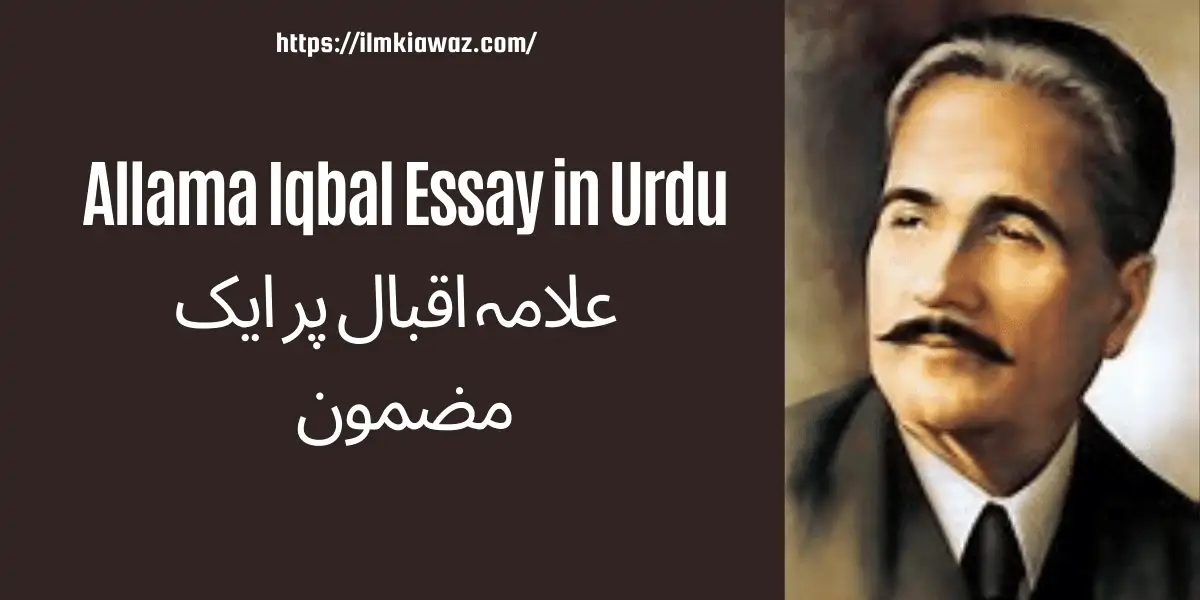

Allama Iqbal Essay in Urdu | علامہ اقبال پر مضمون
August 2, 2023 August 16, 2023

Problems of Karachi City Essay in Urdu 2023 Best Rankings
July 23, 2023 July 24, 2023
About Muhammad Umer
Leave a reply cancel reply.
Your email address will not be published. Required fields are marked *
Save my name, email, and website in this browser for the next time I comment.

- Environment
- Information Science
- Social Issues
- Argumentative
- Cause and Effect
- Classification
- Compare and Contrast
- Descriptive
- Exemplification
- Informative
- Controversial
- Exploratory
- What Is an Essay
- Length of an Essay
- Generate Ideas
- Types of Essays
- Structuring an Essay
- Outline For Essay
- Essay Introduction
- Thesis Statement
- Body of an Essay
- Writing a Conclusion
- Essay Writing Tips
- Drafting an Essay
- Revision Process
- Fix a Broken Essay
- Format of an Essay
- Essay Examples
- Essay Checklist
- Essay Writing Service
- Pay for Research Paper
- Write My Research Paper
- Write My Essay
- Custom Essay Writing Service
- Admission Essay Writing Service
- Pay for Essay
- Academic Ghostwriting
- Write My Book Report
- Case Study Writing Service
- Dissertation Writing Service
- Coursework Writing Service
- Lab Report Writing Service
- Do My Assignment
- Buy College Papers
- Capstone Project Writing Service
- Buy Research Paper
- Custom Essays for Sale
Can’t find a perfect paper?
- Free Essay Samples
Quaid-e-Azam: The Father of the Nation
Updated 06 April 2023
Downloads 62
Category Law
Topic Quaid E Azam
Quaid-e-Azam Mohammad Ali Jinnah: The Father of the Nation
Quaid-e-Azam Mohammad Ali Jinnah, also known as the Father of the Nation, is one of the most prominent figures in the history of Pakistan. He was born on December 25, 1876, in Karachi, and went on to become a lawyer, politician, and leader of the Muslim League. In this essay, we will explore the life and legacy of Quaid-e-Azam Mohammad Ali Jinnah.
Jinnah was the eldest of seven children and grew up in a wealthy family. He received his early education in Karachi and later went to London to study law. He was called to the Bar in 1896 and returned to India to practice law. He quickly became involved in politics, joining the Indian National Congress in 1906. However, he soon became disillusioned with the Congress and its leadership, which he felt did not adequately represent the interests of Muslims in India.
Leadership of the Muslim League
In 1913, Jinnah joined the All India Muslim League and became its leader in 1916. He saw the Muslim League as a vehicle for promoting the interests of Muslims in India and advocating for a separate Muslim state. Jinnah became known for his passionate speeches and tireless advocacy on behalf of Muslims in India.
Jinnah's leadership of the Muslim League culminated in the creation of Pakistan in 1947. He played a central role in negotiations with the British government and other political parties, working tirelessly to secure the creation of a separate Muslim state. On August 14, 1947, Pakistan was born, with Jinnah serving as its first Governor-General.
Jinnah's Legacy
Jinnah's legacy as the Father of the Nation has been significant. He is widely revered in Pakistan for his role in the creation of the country and his vision for a secular, democratic, and modern state. He believed that Pakistan should be a nation where all citizens, regardless of their religion or background, had equal rights and opportunities.
Jinnah's vision for Pakistan was rooted in his belief in democracy, human rights, and the rule of law. He famously said, "You are free; you are free to go to your temples, you are free to go to your mosques or to any other place of worship in this State of Pakistan. You may belong to any religion, caste or creed—that has nothing to do with the business of the State."
Jinnah was also a champion of women's rights and believed in their full participation in all aspects of society. He famously said, "No nation can rise to the height of glory unless your women are side by side with you. We are victims of evil customs. It is a crime against humanity that our women are shut up within the four walls of the houses as prisoners. There is no sanction anywhere for the deplorable condition in which our women have to live."
Jinnah's leadership and vision for Pakistan continue to inspire people in Pakistan and around the world. His commitment to democracy, human rights, and the rule of law remains as relevant today as it was in his time. However, Pakistan has faced many challenges since its creation, including political instability, economic struggles, and ongoing conflicts with India.
Despite these challenges, the people of Pakistan continue to look to Jinnah as a symbol of hope and inspiration. His legacy reminds us of the importance of leadership, vision, and courage in the face of adversity. As Pakistan continues to navigate the challenges of the 21st century, it is essential to remember the words of Quaid-e-Azam Mohammad Ali Jinnah, who said, "With faith, discipline, and selfless devotion to duty, there is nothing worthwhile that you cannot achieve."
Deadline is approaching?
Wait no more. Let us write you an essay from scratch
Related Essays
Related topics.
Find Out the Cost of Your Paper
Type your email
By clicking “Submit”, you agree to our Terms of Use and Privacy policy. Sometimes you will receive account related emails.

Quaid e Azam Essay in English: Architect of Pakistan
Hello Everyone, I hope you’re all doing well. Today, I want to discuss the importance of Quaid-e-Azam Muhammad Ali Jinnah in an essay in English titled “Quaid e Azam”. Let’s explore together why Quaid-e-Azam’s role is so crucial in the history of Pakistan and how his leadership has made a big difference in our lives.
Understanding Quaid e Azam:
Quaid-e-Azam Muhammad Ali Jinnah was a great leader who played a very important role in the creation of Pakistan. Quaid e Azam was born on 25 December 1876, in Karachi. Quaid-e-Azam means “Great Leader,” and Jinnah truly lived up to this title.
Why Quaid-e-Azam’s Leadership Matters:
Let’s take a look at, why Quaid e Azam’s Leadership is important for us.
- Architect of Pakistan .
- Champion of Rights .
- Nation Builder .
- Inspirational Leader .
Quaid e Azam Essay PDF:
The PDF includes:
- An Essay on Quaid e Azam Muhammad Ali Jinnah.
- Why Quaid e Azam Matters.
- Legacy of Quaid e Azam.
- The leadership of Quaid e Azam.
How to Download:
To download the PDF click on the “Download” button given above.
In conclusion, Quaid e Azam Muhammad Ali Jinnah’s leadership is important for us to understand and appreciate because he laid the foundation for the nation of Pakistan.
Thanks for reading and giving your important time to our PDF on Quaid e Azam Essay in English. I hope you find many information about Quaid e Azam’s work. So, feel free to share it with your relatives, friends, and everyone who needs to learn about the great founder of Pakistan.
Our more Valuable PDFs:
We have also more PDFs for you, Hope you’ll also enjoy them:
- Ustad ka Ehtram Essay in Urdu .
- Corruption Essay in English .
- Shajar Kari Essay in Urdu .
- Meri Pasandida Shakhsiyat Essay in Urdu .
- Mera Watan Essay in Urdu .
Related Posts

Do Good Have Good Story: A Heartwarming Tale of Kindness

My Aim in Life Essay Quotations: Inspiring Reflections
Leave a comment cancel reply.
Your email address will not be published. Required fields are marked *
Save my name, email, and website in this browser for the next time I comment.
- UMT Markhors win the first match of PCB Champions Cup
- Art and Faith Intertwine at PU Calligraphy Competition
- Top 10 IT Universities in Germany
- UMT Becomes Official Sponsor of Markhors in PCB Champions Cup 2024
- UAJK Concludes Successful Inter-University Sports Championship
- 10 Best Medical Schools in Europe
- SFDL at ICCBS Solves 8000 DNA and Serology Cases
- Audit Uncovers 99 Unlawful Appointments at AIOU
- Fully Funded Czech Government Scholarships 2025
- PM Highlights Tech Integration in Education on International Literacy Day

Best Essay on Quaid-e-Azam
- by Academia Mag
- October 15, 2022
- 2 years ago

The great leader and founder of Pakistan. His real name is Mohammad Ali Jinnah but widely known as Quaid-e-Azam or Baba-e-Qoum which means the father of the nation. Quaid-e-Azam was born on the 25th of December in Karachi, in 1876. Quaid-e-Azam was a successful lawyer as well as a politician. Quaid-e-Azam’s father’s name was Jinnah Poonja and his mother’s name was Mithibai. Quaid-e-Azam belonged to a rich merchant family.
Quaid-e-Azam received his early education from Sindh Madrasa-ul-Islam and a Christian missionary school. He was sent to England at the mere age of 16 for higher education and later got admission to Lincoln’s Inn Law school to study Law. He returned home after studying abroad, then took over managing his family business.
A few years later, Quaid-e-Azam opened his law firm and became a successful lawyer and by 1900, he was appointed as a magistrate for the region’s presidency. During this time, Jinnah noticed that Hindus and Muslims were united against England, but the Hindu leaders had set their interests somewhere else. Soon after this Quaid-e-Azam left behind practicing law and went on to join political parties so he could take up leadership positions among organizations that planned to form Pakistan’s identity. He started his political career with Indian National Congress in 1906, then after a time span of 7 years, Jinnah joined the Muslim League.
He was a man with great qualities and leadership. He was a human rights activist who constantly fought for the rights of Muslims and dedicated his whole life to the liberation of Pakistan. He tirelessly worked for the Muslims struggling in India and presented their concerns in the 14 points which were rejected by Congress. He endured many hardships for the formation of Pakistan and the rights of Muslims, but he did not give up. However, his efforts did not go unrewarded.
He was a man of his word and one of the greatest spokesmen. Mahatma Gandhi called Quaid-e-Azam “an impossible man” due to his determinacy over his principles. Jinnah always stood like a rock in front of his enemies and never backed down. In 1933, Jinnah became the leader of the Muslim League. In 1940, the Pakistan resolution was drafted by The Muslim League at Minar-e-Pakistan.
After the Pakistan Resolution was passed, Quaid-e-Azam worked tirelessly day and night and did not care about his health at all, slowly his health started deteriorating but he never stopped working. It was due to Quaid-e-Azam’s tireless efforts that Pakistan came into being on the 1947, 14th of August. Quaid-e-Azam passed away on the 11th of September in 1948.
Some of the most famous quotes by Quaid-e-Azam are:
1. “Think a hundred times before you take a decision, but once that decision is taken, stand by it as one man.”
2. “Expect the best, prepare for the worst.”
3. “With faith, discipline, and selfless devotion to duty, there is nothing worthwhile that you cannot achieve.”
4. “I do not believe in taking the right decision, I take a decision and make it right.”
5. “Failure is a word unknown to me.”
Other than essay on Quaid e Azam, you can also read How to Start CSS Preparation at Home
Share this:, discover more from academia magazine.
Subscribe to get the latest posts sent to your email.
Type your email…
Share This Post:
Essay on allama iqbal, iba and undp host an international urban resilience conference.
Based on 0 rating(s)
Recommended by 0 reviewer(s)
By 01 reviewer(s)
This essay is best and excellent for exams point of view
Leave feedback about this Cancel reply
Your email address will not be published.
Recommendation:
Notify me of follow-up comments by email.
Notify me of new posts by email.
Related Post

CA Pakistan General Information

CSS Exam in Pakistan General Information

How to Start CSS Preparation at Home

CSS Syllabus – All CSS Subjects

Subscribe now to keep reading and get access to the full archive.
Continue reading
Quaid e azam essay
quaid e azam essay
Quaid-e-Azam Essay
Answer: Quaid-e-Azam, Muhammad Ali Jinnah, was a pivotal figure in the history of South Asia, particularly in the creation of Pakistan. His vision, leadership, and determination played an essential role in the establishment of a separate nation for Muslims of the Indian subcontinent. Here is a comprehensive essay on Quaid-e-Azam, encompassing his life, achievements, and contributions:
Introduction
Muhammad Ali Jinnah, famously known as Quaid-e-Azam (meaning “Great Leader”), was born on December 25, 1876, in Karachi. He emerged as a critical leader for the Muslims of British India and eventually became the founder of Pakistan. His life and legacy continue to inspire millions of people around the world.
Early Life and Education
Muhammad Ali Jinnah was born into a prominent merchant family. He received his early education at the Sindh Madrasatul Islam in Karachi and later at the Christian Missionary Society High School. His academic capabilities and sharp intellect became evident early on.
In 1892, Jinnah traveled to London to study law at Lincoln’s Inn. It was here that he developed a keen interest in the political affairs of the subcontinent. He returned to India in 1896 as a qualified barrister and began practicing law in Karachi and then in Bombay (now Mumbai).
Political Career and Struggle for Independence
Jinnah’s political career began with his involvement in the Indian National Congress, where he initially worked towards Hindu-Muslim unity. However, he soon realized that the rights and interests of Muslims needed to be safeguarded more explicitly. He joined the All India Muslim League in 1913 and began advocating for the political rights of Muslims.
His foresight and strategic approach were instrumental during the Lucknow Pact of 1916, which marked a temporary unity between the Muslim League and the Congress. However, the growing communal tensions and differing political goals of the Congress led Jinnah to adopt a more assertive stance for an independent Muslim state.
The Two-Nation Theory
Jinnah’s most notable contribution was his articulation of the Two-Nation Theory. He argued that Muslims and Hindus were two distinct nations, with their distinct culture, religion, and values. Muslims, he asserted, needed a separate homeland to freely practice their religion and customs.
This ideology gained significant traction among the Muslim population and culminated in the Lahore Resolution of 1940, which formally demanded the creation of independent states for Muslims in the northwestern and eastern zones of India.
The Creation of Pakistan
Quaid-e-Azam’s relentless efforts and unwavering determination led to the partition of British India and the creation of Pakistan on August 14, 1947. Jinnah became the first Governor-General of Pakistan and worked tirelessly to lay the foundation of the newly established state. Despite facing innumerable challenges, including partition-related violence and refugee crises, his leadership helped stabilize the nascent country.
Legacy and Conclusion
Muhammad Ali Jinnah passed away on September 11, 1948, but his legacy endures. He is revered as the Father of the Nation in Pakistan. His principles, vision, and unwavering commitment to justice and equality continue to guide the nation.
Jinnah’s motto, “Faith, Unity, Discipline,” remains a guiding philosophy for Pakistan. His speeches, writings, and actions demonstrate his dedication to democratic ideals, minority rights, and regional peace.
Final Thoughts: Quaid-e-Azam Muhammad Ali Jinnah’s life story is a testament to the power of visionary leadership and steadfast resolve. His legacy as a champion of Muslim rights and the architect of Pakistan continues to inspire and command respect worldwide.
This essay aimed to provide a comprehensive overview of Quaid-e-Azam’s life, from his early years and education to his significant political career and lasting contributions to the creation of Pakistan. His story is not only important historically but also serves as an enduring source of inspiration.
Home — Essay Samples — Government & Politics — World leaders — Quaid E Azam
Essays on Quaid E Azam
Evaluation of muhammad ali jinnah’s life story, quaid-e-azam's vision and legacy in shaping pakistan, made-to-order essay as fast as you need it.
Each essay is customized to cater to your unique preferences
+ experts online
Quaid-e-azam's Influence on Global Muslim Politics and Identity
Relevant topics.
- Nelson Mandela
- Margaret Thatcher
- Volodymyr Zelensky
- Fidel Castro
- Vladimir Putin
- Sarvepalli Radhakrishnan
- Abraham Lincoln
- Electoral College
- Transportation
By clicking “Check Writers’ Offers”, you agree to our terms of service and privacy policy . We’ll occasionally send you promo and account related email
No need to pay just yet!
We use cookies to personalyze your web-site experience. By continuing we’ll assume you board with our cookie policy .
- Instructions Followed To The Letter
- Deadlines Met At Every Stage
- Unique And Plagiarism Free
Home / Essay Samples / Law / Quaid E Azam / Quaid-e-azam: The Father Of The Pakistani Nation
Quaid-e-azam: The Father Of The Pakistani Nation
- Category: World , Law
- Topic: Pakistan , Quaid E Azam
Pages: 2 (700 words)
Views: 1702
- Downloads: -->
--> ⚠️ Remember: This essay was written and uploaded by an--> click here.
Found a great essay sample but want a unique one?
are ready to help you with your essay
You won’t be charged yet!
Canada Essays
Cyber Crime Essays
Italy Essays
Advocacy Essays
Civil Liberties Essays
Related Essays
We are glad that you like it, but you cannot copy from our website. Just insert your email and this sample will be sent to you.
By clicking “Send”, you agree to our Terms of service and Privacy statement . We will occasionally send you account related emails.
Your essay sample has been sent.
In fact, there is a way to get an original essay! Turn to our writers and order a plagiarism-free paper.
samplius.com uses cookies to offer you the best service possible.By continuing we’ll assume you board with our cookie policy .--> -->